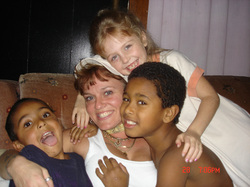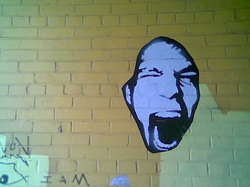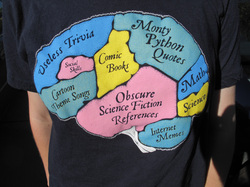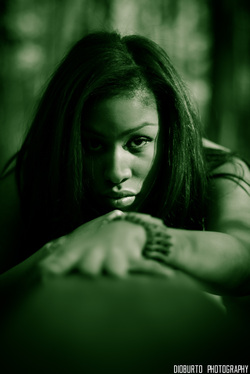 I once heard Maya Angelou say, "When people tell you who they are you should believe them." I'm not sure if she is the originator of the expression, but I will credit her for it anyway. She was, of course, referring to our tendency to want to give people the benefit of the doubt. How many times have you heard someone excuse unacceptable behavior chalking it up to a bad day, stress, or an Irish temper? I used to work in a call center, and we had a manager that was Straight Outa Old School. He was a mean-spirited bully who managed through fear and intimidation. His reign of terror lasted much longer than it should, because with each episode we would shake our heads and say, "Well that's just Tom being Tom." We wanted to believe that deep down he was a really good person who was just a little "crusty." Nothing in his behavior supported that hope, and eventually the organization realized it had to part ways with him. As he was leaving us I thought about all of the careers he had negatively impacted and the number of talented people we lost because of him. What was behind our reluctance to see Tom for who he was? I believe that over time, we refused to see him because we weren't sure what it said about us. Some of us liked Tom. Some of us hung out with him on weekends. If he was a bad guy, and we liked him, did that make us bad? I am thinking about this particularly in light of the 2016 Presidential race. Donald Trump's candidacy has been a display of bad temper, misogyny, racism, and the list goes on and on. Most people felt we were being punked as bit players in some reality television show. But something odd began to happen. People began supporting him in huge numbers. It seemed that Mr. Trump had found a group of people who felt they didn't have a voice in our society. "The Donald" it seemed, was able to stand up and say everything they haven't been able to since they were shoved into the politically correct closet back in the 1980's. "Finally, they opined, someone who can tell it like it is!" I sat back as the months passed, while most people just shook their heads in denial. "How can this be happening?" "How can people be supporting this guy?" Most of these folks believed that his campaign would be short-lived because he was so out of step with the hearts and minds of Americans. Surely, they said, people will come to their senses. But alas, going into the Iowa caucuses Trump was still going strong. And here is where the truth shows up. We want to believe that the Trumps of the world are marginal cave dwellers whose time in our society has passed. We don't want to believe that Trump is who we really are. But if you ask any black person whose been racially profiled, gay person who faced discrimination,or woman who had to deal with a sexist troll at work, this is who we are. It is in fact, who we have always been. We close our eyes to mounting evidence that institutional racism exists, and that the prison industrial system has profited off of the mass incarceration of people of color. When one of our work associates tells us he or she was racially profiled we ask them if the are sure, or if they were just being overly sensitive. Even as we watch Donald Trump dominate the 2016 campaign cycle and discover that the Governor of Michigan knowingly poisoned a poor community in Flint Michigan for profit, we are still in denial. http://cnn.it/1SDpWNw We want to believe that we are a country that is beyond this type of behavior. We want to believe that we live in a free and just society. But how many Trumps will it take for us to realize...this is who we really are? Unless and until we admit and really deal with it, we will keep making excuses for our behavior. Inclusion365 Tip #12 I won't make excuses for bad behavior when I see it. I will call it what it is, and deal with it openly.
1 Comment
 There are times when I truly feel like I am having an out of body experience. Sometimes I watch the news or I see something tragic happen and I think, "seriously? Did this just happen?" This week, was one of those weeks. During the NFC Championship game post-game interviews Seattle Seahawks defensive back, Richard Sherman gave an overly emotional post-game interview to Erin Andrews. Now, when I say over-emotional I mean he went "full hood." Black people in America have learned that you never go "full hood." Most people love the cool black man who gives them a high five and fist bump, they even love the funny black man who keeps them laughing and constantly entertained. But we do do not like the dangerous black man, amped up on testosterone and yelling at the top of his lungs. No. That black man is scary and should not be tolerated under any circumstances. Richard Sherman, and the rest of us found this out the hard way. I was sitting on my sofa when the incident occured. After 10 seconds it was clear to me that his emotions were too raw for television. I remember waving my hand at the screen and saying " move on, cut to something else, don't show this!" But, my reaction was out of concern for the man, and not out of desire for "good television" so, the camera did not cut away, instead it lingered there and broadcast this man's meltdown for all of the world to see. I knew when it happened it would be all over Sports Center and I would have to see it over and over and over again. I was irritated. I am tired of sensationalism hi-jacking my sports channels and I knew this was going to be a "thing." I was not prepared for just how big a "thing" this would become. The next morning I heard the usual hue and cry about poor sportsmanship, and respecting the game, all of the things I could nod my head an agree with. But as the day went on, and I started reading articles and blogs the conversation turned to something that I just could not believe. Richard Sherman went from an emotional player who may have behaved inapropriately on television for 30 seconds to "thug" which in our society has become code for n****r. People were berating him and referring to him as a "monkey" and piece of s***. Really? Yes, really. The thing that I found most disturbing was that although Richard had been over the top, he hadn't used profanity or any threatening language, and yet people were treating him as if he had pulled out an AK 47 and dropped a million f-bombs. He didn't. He never swore and he never hit anyone or threatened anyone and yet he was being hailed as a thug and a gangsta piece of trash who didn't deserve to live. What was said about Richard Sherman was far more problematic than anything Richard Sherman actually said. Americans, from the safety and anonymity of their keyboards showered their racist hatred upon this man in quantities that, to me, were alarming. It has become part of the narrative about black athletes. There are 1,700 players in the NFL. In 2012 39 of them had some sort of run-in with law enforcement. 39 is less than 1% of NFL players, and yet, we constantly hear ranting and raving about all of the gangsters and thugs in the NFL who can't stay out of prison. The reality is that less than 1% of them have trouble with the law. And yet, that's the narrative. Black athletes ( people) are criminals. It has always been this way, and until this incident I found it mildly irritating. But this week, the tenor surrounding this story was so over the top, that it made me angry. It was so prevalent that even white bloggers and columnists were crying foul. http://www.huffingtonpost.com/isaac-saul/what-richard-sherman-taught-us_b_4631980.html Inclusion365 mission# 11 I will not allow stereotypes, no matter how pervasive, to predetermine my assumptions about the character, nature, or abilities of another person.  Washington Post columnist Richard Cohen came under attack recently for writing a column in which he expressed some controversial views regarding the acceptance, by "conventional" people, of mixed race couples and their multiracial off spring. Specifically, he said, " People with conventional views must repress a gag reflex when considering the mayor-elect of New York — a white man married to a black woman and with two biracial children. (Should I mention that Bill de Blasio’s wife, Chirlane McCray, used to be a lesbian?) This family represents the cultural changes that have enveloped parts — but not all — of America. To cultural conservatives, this doesn’t look like their country at all." Now, I admit that when read that statement my first thought was, "oh, boy...he is going to get fired for that." My second thought was, " He shouldn't be fired, he is speaking the truth." The truth. Isn't that what journalism is all about? Now, I am almost certain that given Mr. Cohen's body of work, he wrote that statement with the intent of stirring controversy and driving traffic to his blog. He has put his foot in his mouth too many times to claim being misunderstood at this point. He knew what he was doing so I really don't hold him up as any sort of hero. But I do think he represents what is too frequently lacking in our society. The truth. Just to be clear, I am not advocating the race-baiting, hate and fear mongering speech of people like Rush Limbaugh. But putting pen to paper and expressing an opinion that a lot of people share? I think that has to start being acceptable again. You see, we have decided that we are a post-racial society. And therefore, we have decided that we are beyond racial bigotry and prejudice. Anyone, who stands up and says " Not so fast, I am not there yet." is not welcome in the arena of public discourse. So, we have effectively thrown a blanket over all of the ugly that exists in our society and joined hands in one beautiful "I'd like to teach the world to sing in perfect harmony" moment. We hold our heads high and point to our first visibly ethnic president and say "Yea Us! We did it!" But if you look closely at the blanket, you will see that wriggling underneath is the same racial animosity and hatred that has existed since the first white people landed here and declared it "my country." We prance merrily along, while "Stop and Frisk" is common practice by police forces all over the country not just in New York. We turn a blind eye when Stand Your Ground Laws are used as an excuse to stalk and murder a black teenager because he dared to walk in the wrong neighborhood wearing a Hoodie. The Supreme Court struck down voting rights laws and before the ink was dry the state of Texas enacted laws that officials openly admitted were designed to suppress minority voters. In October of this year, a young black college football player was murdered by police, because after a car accident he knocked on the door of a white woman and asked her for help. She was so terrified that she called the police and told them he was trying to break into her house. I could go on and on here, but I think I've made my point. Just because we want something to be doesn't make it so. We want to be an open tolerant society, but wanting it and being it are two completely different things. I lived in Oakland County, Michigan for three years. I was shocked at the number of times I was subjected to racially offensive remarks and actions by the people living in that area. It was so bad that I actually began to have physical symptoms of stress and anxiety. But every time I would try to convey one of these incidents to my co-workers I would get the same patronizing response. " Are you sure that is what they meant? Are you sure this happens all the time? Are you just being sensitive?" And then they would go on to tell me in their polyana sing-song voices about how diverse their neighborhood is, and how they just love it! The problem is, the more we deny the inherent racism in our society, we will never truly be able to address it and correct it. The more we silence the Richard Cohen's of the world and force them to stop speaking the truth, the longer we will stunt our growth into a fully inclusive society. There are people blocking true progress in this country and we need to acknowledge them and the continued need for education and awareness in our society. We can all pretend that racism and the subsequent discrimination that comes along with it do not exist in our. Or, we can acknowledge the progress that has been made, and determine to make even more progress in our lifetime. The choice is ours. Inclusion365 mission#10 I will not be so blinded by the vision of an inclusive society that I ignore the work that is still to be done.  I love football. I am not just a fan of football, I live for it. If it were not for football I would fall into a winter funk so strong grizzly bears would wonder what was wrong with me. It is the only thing that gets me through the harsh cold winters and I cherish it the way some people cherish their children. So, you can understand why I don’t take kindly to anything that detracts from the sport. I don’t like certain new rules the commissioner forces on the players and, recently, some of the players themselves are starting to get on my nerves. Enter Riley Cooper. Riley Cooper is just the latest in a recent trend of athletes behaving so stupidly off the field, that I must now waste precious hours of my life hearing about it instead of focusing on the upcoming slate of games. It ticks me off. I am sick of it. I am sick of turning on the NFL network or ESPN and hearing the same tripe and drivel that I purposely turn away from on E! or Entertainment tonight. I don’t want scandal…I want football. Should Riley Cooper have used the “N” word in a drunken fit at a country music concert? NO. Let me settle this once and for all for all of you non-African Americans. Do not use the word. I know rappers use it. I know black athletes use it. I know millennial black kids use it. But here is the thing. As misguided as I think it is, I know why they use it. It is a term of endearment between people who share a common experience. When white people say it isn’t fair, that black people can say it and they can’t, it always makes me suspicious. Why do you want to use it? What is it about that word that is so intoxicating that you just have to say it? I am a straight woman. I know some gay people who use the word “faggot” when talking to or about each other. I always shake my head when I hear it, but I have never wanted to say it. Do you want to know why? I know that young people like Matthew Shephard heard that word as they were being stomped and beaten to death. Many young gay people have committed suicide because of the pain that word caused them as it cam hurling toward them out of the mouths of straight people who thought it was their right to belittle them. I can’t explain why gay people would use that word, but it is none of my business. As a straight person, I do not want to be associated with such a vile and ugly word and you will never hear it come out of my mouth. Given the history of the word “nigger” in our society, I can’t understand why a white person would want to say it either. Regardless of what your opinion is, you can’t deny that word is a bombshell just waiting to explode. My earnest and sincere plea to all white players in the NFL, please don’t ever say it again. I want my football season back! Now, let’s talk about and strip clubs and guns… Inclusion 365 mission #9 I will never allow myself to be associated with a word or phrase that causes pain to others, no matter what social mores allow.  In my role as Chief Diversity Officer for my company, I recently attended a learning lab about unconscious bias. The theory of unconscious bias is that we human beings are not bad people we just hold unconscious beliefs about various social groups. It’s how our brains work. It was interesting material, with just the right mix of neuroscience and practical application to keep me engaged as I thought of ways to apply this learning in my organization. At one point, the instructor was explaining implicit association; the series of conclusions our brain automatically makes when it senses danger. For example, we don’t have to touch fire every time we see it to know that it will burn us. As a way of demonstrating his point, he told us a story about flinching when he saw a young African American man walking toward him. On reflex, he locked his car door. The young man saw him, and there was an awkward moment that passed between the two of them. His brain saw this young man as a threat, he posited, because of images on the nightly news. As I sat there in that class listening to the story and the conversation that followed, I found myself fighting back tears. While, they were talking about nameless, faceless young men I was thinking about my 23 year old nephew. I remembered potty training him and teaching him how to ride his bike and tie his shoes. I thought of all of the times we cuddled under a blanket and watched Monday Night Football after consuming a heaping plate of home-made nachos. I thought about helping him with his homework and beaming with pride at his high school graduation. And I thought about him now. At six feet two inches tall and 250 pounds, he is the stuff of some people’s night mares. To me, he is a kind and thoughtful young man. I sat there fighting tears because I have witnessed my nephew, in his hoodie, walking to the corner store for a bag of chips and a soda. I now realize that there are people who would feel justified in suspecting he was a criminal simply because of the color of his skin. I have been a vocal champion of diversity and inclusion for years, but on this day I found myself speechless while tears streamed down my face. We can blame our brains and distance ourselves from the reality of how hurtful our actions can be, but that won’t make it right for my nephew or the thousands of young men like him who find themselves under constant suspicion. While it is true that I don’t know every young African American man I see walking down the street, I do know the one who lives in my house. That is enough for me to challenge my bias, and give the rest of them the benefit of the doubt. Inclusion 365 Mission #8 I will always challenge my internal biases, I will not use the media, society, or my brain as an excuse to prejudge people or circumstances  One of the continuing challenges in building a multicultural workplace, is actually getting multiple cultures into the workplace. It seems the conversation around diversity is shifting once again to reflect the global nature of business and the number of companies who now have presence in many countries around the world. My company is not any different. The last time I counted we had 23 countries represented in our various U.S. work locations. Transferring talent around the globe is something we do quite frequently and is actually a strong recruiting position for us. I have noticed that we have no trouble embracing our European colleagues and even our Latin colleagues, but alas, the same can not be said of our domestic "home grown" cultures. You know what I mean. When we hear a German accent or a British accent, we immediately think "Wow. How cool!" We assume the speaker has something we don't. And, even if we can't understand a word they are saying, we somehow feel that they are in some way superior to us because after all, English is not their native tongue. How special are they for butchering the English language? Applause, applause. Here is what I have also noticed. When the accent is from say, Alabama and not Berlin, the assumption conferred on the speaker is not one of superiority, but inferiority. When the speaker doesn't have a funky European sense of style, but rather a funky head of hair, we are suddendly not so enthralled with their "difference." Why is this? My view is that as Americans, we still have not resolved our bias that tells us that people of color are innately inferior. And when we hear certain accents, including American regional dialects, we turn off. And thus, the challenge I have in attracting and retaining a multicultural workforce (that is not European). We recenty did a round of recruiting for our college graduate program. Included in our recruiting tour were several Historically Black Colleges and Universities. We met some wonderfully gifted, intelligent, and bright students who fit our hiring criteria. The first step in the screening process what the resume and college GPA. The second step in the screening process is the phone interview. Here is where the bias creeps in. Of the resumes we deemed qualified, only 3% of those students were still considered worthy after the phone interview. Really? How do you go from being brilliant on paper to utterly unattractive after a phone conversation? In another instance, I was attempting to place summer interns through the INROADS program, which focuses on placing minority students in interships withing corporate america. The resistance I met from some of the hiring managers was mind blowing. We are takling about freshmen and sophomores in college. And yet, the screening criteria that these students were held to was for experienced professionals. I kept getting excuses like, " well, they don't really have the experience I need." Really? What kind of experience do you need to be a summer intern? What exactly was missing? " Well, they have never written any code..." Have your other summer interns written code or analyzed P&L statements, or created marketing campaigns? How many 18 year-old college students have? It' almost as if, if you are a person of color, you have to be exceptional just to walk in the door. This is an impossible standard, and is the reason we have so many "firsts" who end up being the "only" and the "last." I would challenge anyone who is responsible for recruiting and hiring to pause a beat before disqualifying a candidate. Ask yourself; if this person was white from the University of Michigan, would I be so reluctant to bring them into the organization? Would I be so concerned with the lack of depth of their experience to fill and entry-level or internship position? We can't build a pipeline of multicultural talent if our funnel is so narrow that it doesn't let anyone in. As long as we are allowing our bias to cloud our perceptions of people, we will continue to have only the fortunate few who somehow manage to transend our prejudices and racial bias to grace the hallowed halls of our institutions. I have always agreed that diversity is more than race and gender. I love discussing generational differences, and working effectively across cultures, but we can't just forget about race and gender. We can't file it away as something we have resolved, when there is evidence everywhere in our society that indicates that clearly we have not. Inclusion 365 mission #7 I will not accept that black and brown people have to be exceptional to get an opportunity. I will make an effort not to require more those of the minority than I do from members of the dominant majority.  I recently attended an Unconscious Bias Learning Lab in Silver Spring Maryland run by Howard Ross of Cook Ross, Inc. If you ever get the chance to experience it, I highly encourage you to do so. I won't say it was mind blowing because that is hyperbole, and working in German company for the past 18 years I am sensitive to the way other cultures react to our American tendancy to exagerate. I will say it was enlightening. For years we have approached the discussion of diversity by lining people up into two camps. On one side we have the poor, oppressed, downtrodden, under- represented, under-priveledged minority. On the other side we have the priveledged, mean-spirited, bigoted, racist, ageist, sexist majority. Good vs. Evil. Simple. Classic. False. The study of Unconscious Bias looks at way the brain uses "mental associates that are so-well established as to operate without awareness or without intention or without control." ( Project Implicit, Harvard University) Bias stems from our automatic tendency towards fight or flight; it keeps us alive. Bias helps give our world order and saves us from having to think through every decision or action. If I have touched a hot stove and burned myself, I don't have to ask myself every time I see a hot stove whether or not I should touch it. I know better. My unconscious mind is programed to processes that informatin so that I don't have to think about it. The problem is, when that programming causes me to have bias toward members of groups, I behave in ways and make decisions that impact people...and I may not even be aware of it. In fact, bias often conflicts with concious attitudes and intentional behavior. How many times have you been appalled at the words that came out of someone's mouth that you would have previously described as open-minded or fair? During the last national political campaign I saw a bit on The Daily Show where people at the Democratic Convention were patting themselves on the back for being the party of inclusion, but they were captured on camera saying things like..." We welcome everyone except those tea-baggers!" Hillarious! Now, this new way of looking at human behavior does not in any way attempt to excuse those who are intentional and deliberate about their "ism." Those people know who they are and so do we. This is about helping us understand how it can be that organizations have had diversity initiatives in place for the past 20 or 30 years and still have a majority of white men in almost every leadership position. I don't think it is a coincidence that only 14% if men in this country are over 6 feet tall, while 60% of CEO's are over six feet tall. Somehow, we got it into our heads that tall white men were fit to lead and other's weren't. Somehow we reflexively attribute some value to being tall that has nothing to do with a persons competencies. We have a tendency to look for what confirms our beliefs and ignor what contradicts our beliefs all the while ignoring the truth. Recently, my boss and I were discussing our efforts to bring more ethnic minority talent into the organization at the management level. We interviewed a candidate I thought was a solid choice. The other people involved in the process kept hesitating and asking questions, picking at the persons background and judging his "fit". I said to my boss, " You have to be exceptional if you are a black person or a woman if you want to get into this place. Only exceptional minorities make it here. Which is funny becasue there are a whole lot of mediocre white men running around." ( my boss and I have these candid conversations all of the time because we have built that kind of realtionship over the years. ) He laughed and said. "It's not fair...but you are right!" His is correct. It isn't fair. So, we hve made a decison. We are going to expose our HR consultants and Recruiters to this unconscious bias training, because I think understanding how bias impacts our decisions around talent management and recruiting will be critical in changing the demographics of our organzation. It isn't about being good people or bad people...it's about being informed and aware people. Inclusion 365 Mission #5 I will pay attention to how I am treating people and check to see if my mind is "filling in the blanks" based on some assumption I am making based on past experience or programming. I will challenge my biases, both conscious and unconscious and be honest with myself.  Loud. Brash. Angry. Aggressive. Ratchet. Hoe. Gold Digger. In the past month, I have read articles in newspapers and magazines all using these words to describe black women. These adjectives are commonly used to describe women who look like me, and yet I have no connection to them. They don't resonate with me at all. I suppose it is possible that I am just not self- aware enough to see myself in those words, but I have had enough 360 degree feedback in my life to guess that is not the case. People love to speculate about why black women can't find domestic bliss (the statistics tell us that 50% of black women never marry and we know statistics don't lie.) The media is full examples of black men marrying anything they can get their hands on other than black women. Most of the time when there is a black man on television or in a movie his love interest is usually white, asian or latina. This perpretuates the idea that black women are less desriable than other women and black men are staying away from us in droves. What the media doesn't tell us, that the U.S. Census Bureau is happy to inform, is that black men marry black women almost 80% of the time. But, let's not get confused with facts. Let's keep talking about why black women are alone, lonely and miserable. Loud. Brash. Angry. Aggressive. Ratchet. Hoe. Gold Digger. For the record, I am a happily single child-free black woman who hangs out with other black women I would describe as lively, professional, accomplished, sophisticated, caring and independent. Hmmm...quite the disconnect. There is an expression we use in Diversity Awareness training that goes something like " we all view the world through the lens of our own experience." I believe this is true. If I have a negative experience with one member of a group of people, it could taint my perception of the entire group. Or, if I am some how invested in my perception of a group of people because it makes me feel good, or feeds my ego, or asuages my guilt, I am going to look for evidence everywhere that my perception is valid. I think if most of us were honest with ourselves we would admit that this is the case. The problem, as I see it, is that when you are in a position of power or influence you have the ability to act on your biases and prejudices and influence other people. The people who control the images of black women that get shown in television, movies, videos, etc. are not black women. These individuals are de-selecting the women who represent the women I know, and they are actively selecting the women that feed into their image of who black women are. That is problematic in my opinion. But it also leads me to think about this: What influence do I have? What story am I telling the world about groups of people that I don't really know? How am I subtley (or maybe not so subtley) influencing the way my organization or colleagues view groups of people. Am I just slipping up when I refer to young men as "little boys" because it is a silly little habit I can't break. When I ask "What is the name of that little boy who works in finance"? Am I just using a harmless expression, or is that my passive aggressive way of communicating that I am in charge? Or, am I just so preoccupied with my own aging body that I think anyone younger than me is a "little boy" or a "little girl?" Jealous much? Whatever the reason, I should probably resolve to stop it. Inclusion 365 Mission #4 I will remember that the words I use to describe groups of people can not only project my biases, but could potentially influence the way those groups are viewed by others. I will judge people on their merits and not by my preconceived notions of who I think they are.  Learn to lose, it’s easier that way We’ve paid our dues, but we can’t make life pay All across the world, people going mad In their mother’s cars, the kids are feeling sad That’s how it is, and I’ll see you later Everything old is new again Everything under the sun Now that I’m back with you again We hug and we kiss We sit and make lists We drink and I bandage your wrists Ok, I know it seems I am starting the year on a less than optimistic note. This quote from the Bear Naked Ladies "Everything Old is New Again" sums up how I'm feeling as I dive into the new year. I have often said that my relationship with my employer (19 years) is the longest and most successful relationship I have had in my life. In many ways it reminds of other intimate relationships like marriage, or parenting...etc. After a while it is hard to get excited and compromise and adjusted expectations becomes the norm. Years pass and you decide that staying is better than leaving so after you have decided not to part ways, you settle into a rhythm that just keeps things moving. I have been working in the diversity and inclusion space for the better part of 8 years now, and I am settling into that frame of mind in relation to my work. Don't get me wrong. I am proud of the work that I do and proud of my organization's achievments. But I don't think I am telling tales out of school when I say that some areas have seen little or no progress over the years. And we are not alone. According to a recent DiversityINC article, of the Fortune 500 CEO's only 3.8% of them are ethnic minorities. Women hold a mere 4.2% of the CEO positions in those companies. Now, I know what you are thinking: " But haven't we been at this diversity thing for like...30 years?" At least. I don't have the answer. I don't think anyone does, but we all keep trying. Every year I update the strategy and implement more programs and preach the gospel of the value of diversity to more people. It reminds me of the line in the song that says "we hug and we kiss, we sit and make lists..." I'm not going to say it is futile. The moment I lose my passion for the work and conviction that my work makes a difference, I should hang it up. So I will press forward, but not with the blind optimism I once had. I will press forward knowing that if I can impact the culture even a little bit, it is more than it was yesterday. If I can help create an opportunity for a young college student, or a women new in her career, then I have done somethng meaningful. Everything old is new again...including my 2013 Diversity and Inclusion strategy. Inclusion 365 mission#3 I will remember that a pebble thrown in a lake creates ripples it doesn't feel or experience. I will continue to urge my organization and those in my cirlce of influence to keep pressing for change.  The Holiday season is one that is often fraught with danger for Chief Diversity Officers. Some topics are innately emotional for people. Money is number one, family and children are number two and religion is number three. During the months of November and December the workplace becomes an emotional minefield where normally rational people become hyper sensitive and dogmatic. In matters of diversity, we often speak in terms of majority culture vs. minority culture. Generally the view is, if you are part of the majority culture the onus is on you to be more sensitive and appear overly accomodating ( inclusive) of other cultures. We expect men to behave themselves when we introduce Women's leadership training and we expect our white colleagues to understand why we have executive mentoring programs for ethnic minorities. And, for the most part, I would say they do. However, when it comes to Christmas...all bets are off. When it comes to the intrusion of religious inclusion in the workplace, Christians seem more unwilling than others to embrace the high road of diversity. They don't understand why their colleagues would object to a Christmas Tree in the lobby, or playing Christmas Carols over the sound system. "It's Christmas!" they declare. " and America is a Christian nation." Well, the problem is this. It is also Hanukkah (Jewish), Ashura (Islamic/ Muslim), St. Nicholas Day (Europe) Boxing Day, ( Canada) and Kwanza ( African American), etc. How does and organization that is comiited to building an inclusive workplace handle the question of religious celebrations in the workplace? Well, in my opinion, it has to be all or nothing. If you recognize one religion, then you have to provide the space for the recognition of all religions. If an individual wants to hand out chocolate santas to his co-workers in honor of St. Nicholas Day or place a minorah on her desk, then other employees should be allowed the same freedom. The organization, however, should not be seen as promoting one religion over another. I have advised my organization to decorate our hotel lobby in very festive holiday decor, minus the Christmas Tree. As an individual, I will be celebrating Christmas. I will say "Merry Christmas" to people I encounter in stores. I will personally always understand that, for me, Jesus is the reason for the season. I will also, however, listen intently while my Hindu colleagues tell me the details of Ashura, and I will enthusiastically play a game of Dreidel if invited to participate by my Jewish colleagues. Inclusion 365 Mission#2 I will honor my religious heritage and beliefs while respecting the religious heritage and beliefs of others. I recognize that the country I live in, is a great quilt made up of unique and varying elements, none more important than the other. I will remember to hold fast to my own beliefs and convictions without diminishing the beliefs and convictions of others. |
AuthorI am a Diversity practitioner wondering if it is possible to practice what I preach and live by the principles of diversity and inclusion everyday. Archives
May 2017
Categories
All
|
 RSS Feed
RSS Feed